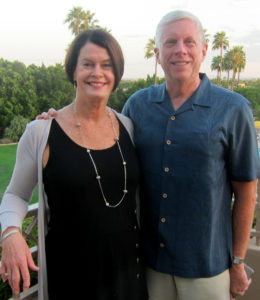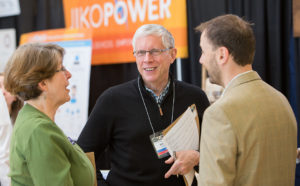Inside the Accelerator: The McAleer Early Start Fund
 When you’re an early-stage startup, particularly a student one, one thing can make a difference between success and failure: runway. The earlier the startup, typically the less cash on hand. Certainly, that is the case for many teams in the Jones + Foster Accelerator at the Foster School’s Buerk Center for Entrepreneurship. That’s why Voyager Capital partner Bill McAleer and his wife Colleen are such difference makers. They decided to make a gift to the program to help J+FA teams with early expenses.
When you’re an early-stage startup, particularly a student one, one thing can make a difference between success and failure: runway. The earlier the startup, typically the less cash on hand. Certainly, that is the case for many teams in the Jones + Foster Accelerator at the Foster School’s Buerk Center for Entrepreneurship. That’s why Voyager Capital partner Bill McAleer and his wife Colleen are such difference makers. They decided to make a gift to the program to help J+FA teams with early expenses.
“We agreed that $1,000 should be a seed resource for each company and we funded it in a way where each cohort gets access,” said McAleer. “It helps with some of the basic expenses to get the company incorporated, and maybe to secure hosting services. These companies need seed money to off the ground and hopefully it’s helping to make a difference.”
Colleen is a MBA graduate of the University of Washington, while Bill earned his MBA at Cornell University. They first got involved with the Buerk Center after Bill co-founded the venture capital firm Voyager, which focuses on early stage investments in emerging tech companies. “Colleen is an entrepreneur and had her own business for about 27 years,” said McAleer. “And we had made a sizable donation to the computer science school already. But we also wanted to help Buerk Center students.”
 Bill first connected with former Buerk Center director Connie Bourassa-Shaw (who was second in-charge in the Center at the time) and became an early sponsor and judge in the UW Business Plan Competition (now Dempsey Startup Competition). That quickly turned into a position on the Advisory Board for the Center, including a decade of serving in the role of Board Chairman. Not only would he play a critical role in advising then Dean Jim Jiambalvo to appoint Connie as director, but he was part of the team that helped form the basis for an Accelerator.
Bill first connected with former Buerk Center director Connie Bourassa-Shaw (who was second in-charge in the Center at the time) and became an early sponsor and judge in the UW Business Plan Competition (now Dempsey Startup Competition). That quickly turned into a position on the Advisory Board for the Center, including a decade of serving in the role of Board Chairman. Not only would he play a critical role in advising then Dean Jim Jiambalvo to appoint Connie as director, but he was part of the team that helped form the basis for an Accelerator.
“One of the things we recognized was that there were great ideas coming out of the business plan competition, but they needed some more help and mentoring and connections and money,” said McAleer. “We did some work trying to figure out how we could help coach these promising teams and devised a cohort program. Fortunately, (the Accelerator) was funded by the Herbert B. Jones Foundation (and others) and this whole incubation idea got off the ground.”
Now McAleer balances his active role as partner at Voyager with continued work on the Advisory Board and coaching students involved in starting company ideas. In this way, McAleer gets a chance to share lessons learned over 30 years of senior executive and investment experience. “I always tell our entrepreneurs that if you’re tight on money, the easiest source of money for you is your customers. Use customer money to grow your business if you can and use capital to scale your business.”
When it comes to students, the message is even more straightforward. “I think the biggest lesson I try to talk to the students about is the importance of understanding what your passion is. If you want to be an entrepreneur, that’s great. If you don’t want to be an entrepreneur, you can be very successful as well.”
Bill certainly has found success as a venture capitalist and continues to be actively involved in entrepreneurial activities across the Pacific Northwest. At Voyager, they closed their fifth $100 million fund targeting B2B tech startups based in the Pacific Northwest in fall of 2019.
“I think what keeps the spark going is helping entrepreneurs to grow their ideas and working with founders who are passionate about making a difference,” said McAleer. “I would tell anyone who has a good idea to go pursue it. And then, surround yourself with good people and make it happen.”
Bill McAleer and Voyager Capital have been one of the valued sponsors of the UW Business Plan Competition (now Dempsey Startup Competition) since 2001. Colleen McAleer serves annually as a judge in the Alaska Airlines Environmental Innovation Challenge, adding that she feels “students will lead the way in climate change solutions, and our support is a tangible way to make that happen.”
